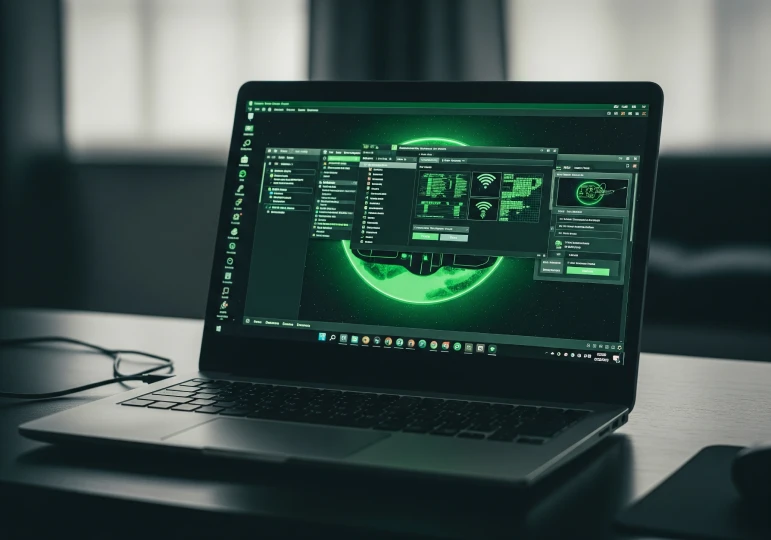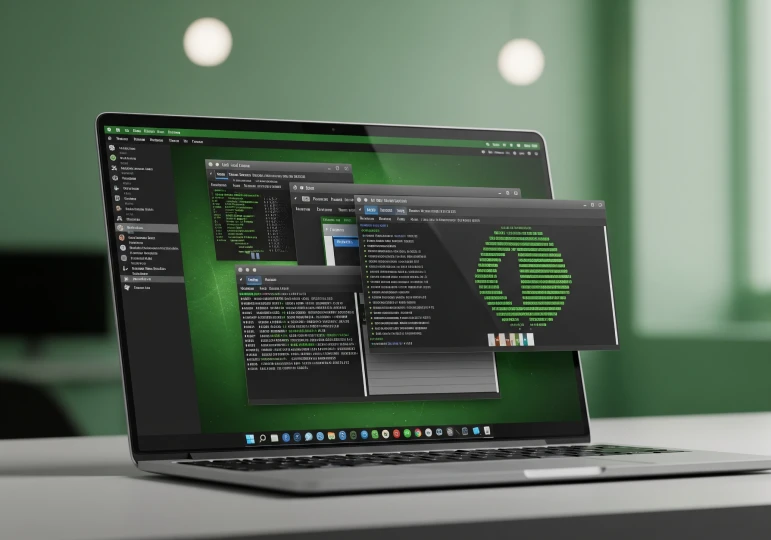Known as a favorite among ethical hackers, Kali Linux features make it one of the most powerful tools in cybersecurity. It is an open-source operating system built for penetration testing, vulnerability assessment, and digital forensics.
Most learners know Kali Linux for its use in ethical hacking, but its capabilities go far beyond standard penetration testing. It comes with hundreds of pre-installed tools, supports multiple hacking environments, and can be customized for various security tasks.
Why is it so popular?
- It is free, lightweight, and highly flexible
- Packed with professional-grade hacking and security tools
- Trusted by both beginners and experts in the field
In this blog, we will look at 9 powerful things Kali Linux can do that many users overlook. These features will help you understand why it’s more than just a hacking OS and how it supports a wide range of security tasks.
Feature 1: Wireless Security Auditing
Kali Linux is widely known for its ability to audit and test wireless networks. Wireless security auditing is the process of checking Wi-Fi networks for vulnerabilities that attackers could exploit. Ethical hackers use this capability to strengthen wireless systems and prevent intrusions.
Kali Linux includes a range of tools that make this task easier and more effective:
- Aircrack-ng – a popular suite for testing Wi-Fi network security and cracking weak passwords
- Reaver – used to exploit vulnerabilities in Wi-Fi Protected Setup (WPS)
- Wifite – automates the process of testing multiple access points quickly
- Kismet – a tool for detecting and analyzing wireless networks
These tools help security professionals identify weak encryption, poor configurations, or unauthorized access points in a network. By simulating attacks, they can reveal flaws before real attackers exploit them.
Wireless auditing is critical because most businesses and homes rely on Wi-Fi as their primary connection. A poorly secured network can lead to data theft, malware infections, or unauthorized access.
For ethical hackers, mastering wireless testing with Kali Linux is an essential skill. It allows them to detect vulnerabilities, suggest fixes, and ensure that wireless networks remain secure against real-world threats.
Feature 2: Advanced Password Cracking
Among the many Kali Linux features, advanced password cracking is one of the most powerful. Passwords remain the first line of defense for most systems, and testing their strength is a critical part of penetration testing.
Kali Linux comes equipped with several tools that help ethical hackers legally test password security:
- John the Ripper – a fast tool for detecting weak passwords by running dictionary and brute-force attacks
- Hashcat – known for its speed and ability to crack complex passwords using GPU power
- Hydra – ideal for testing password strength across multiple protocols
These tools simulate attacks to identify passwords that are easy to guess or stored insecurely. During penetration tests, ethical hackers use them to strengthen defenses, not to exploit systems.
Real use cases include:
- Checking the strength of employee passwords during security audits
- Detecting weak encryption in databases
- Ensuring compliance with security policies
With the rise of sophisticated attacks, tools like these remain at the core of ethical hacking tools 2025. They help organizations uncover weak points before attackers do. For learners, mastering password cracking tools in Kali Linux is essential to understanding how vulnerabilities are found and fixed in real-world environments.
Feature 3: Digital Forensics Capabilities
Kali Linux is not just for penetration testing; it also provides strong support for digital forensics. Digital forensics involves investigating cyber incidents, recovering deleted files, and analyzing compromised systems without altering the evidence.
Kali includes several tools that make forensic investigations easier:
- Autopsy – a user-friendly platform for analyzing disk images, recovering files, and examining browser activity
- Sleuth Kit – a command-line suite that allows detailed file system analysis and evidence collection
- Foremost – used for recovering deleted files based on headers and footers
- Binwalk – helpful in analyzing and extracting firmware for embedded devices
These tools help ethical hackers and forensic experts track how an attack happened, what data was accessed, and how to secure the system afterward.
Common uses include:
- Recovering evidence from hacked devices
- Investigating malware infections
- Analyzing deleted or hidden files in legal cases
- Identifying traces left by attackers
What makes Kali Linux valuable for forensics is its ability to create a secure environment where evidence remains intact. Investigators can boot Kali in a forensics mode, which ensures no accidental changes are made to the storage being examined.
For learners, understanding forensic tools in Kali is essential. It shows how cybersecurity is not only about prevention but also about uncovering what happened after an attack and using that knowledge to strengthen defenses.
Feature 4: Reverse Engineering Software
Among the many Kali Linux features, reverse engineering stands out as an advanced capability. Reverse engineering is the process of deconstructing software to understand how it works, find vulnerabilities, or analyze malicious code. It is a critical part of cybersecurity, especially for malware research and vulnerability assessments.
Kali Linux includes several tools that make reverse engineering accessible to professionals:
- Radare2 – a powerful framework for analyzing binaries, debugging, and patching software
- Ghidra – a sophisticated reverse engineering suite developed by the NSA, now open-source and included in Kali
- OllyDbg – useful for dynamic analysis of executables
These tools help ethical hackers and researchers dissect applications, uncover hidden functionality, and detect security flaws. They are also used to analyze malware, allowing experts to understand how malicious code spreads and how to defend against it.
Why it’s valuable:
- Detects vulnerabilities in applications before attackers exploit them
- Provides insights into malware behavior and attack patterns
- Supports development of stronger security patches
Reverse engineering is an area where advanced Kali Linux tools shine. It requires patience and technical knowledge, but mastering it opens doors to specialized roles in malware analysis, exploit development, and secure software design. For learners, it is a challenging yet rewarding skill that strengthens both offensive and defensive security expertise.
Feature 5: Social Engineering Tools (Legally Used)
Kali Linux is not limited to technical attacks. It also includes tools that focus on the human side of cybersecurity, known as social engineering. Social engineering is the art of tricking people into giving away sensitive information, often through phishing emails or fake websites. Ethical hackers use these tools to test how well an organization’s employees respond to such attacks.
One of the most well-known tools in Kali for this purpose is the Social Engineering Toolkit (SET). This tool allows security professionals to simulate various social engineering attacks in a controlled and legal environment.
SET can be used to:
- Create phishing campaigns to test employee awareness
- Clone websites to demonstrate credential theft risks
- Generate payloads for security training exercises
- Run spear-phishing tests with permission
These simulations are not meant to harm; they are designed to educate. Companies use them to identify weak points in human behavior and improve training programs.
Ethical and legal use cases include:
- Security awareness training
- Corporate phishing simulations
- Demonstrating risks during cybersecurity workshops
Using tools like SET under proper authorization helps organizations strengthen their defenses. For learners, understanding social engineering tools highlights an important fact: technology is only one part of security. Human awareness is equally critical, and testing it ethically is a key skill for any ethical hacker.
Feature 6: Cloud-Based Penetration Testing
One of the lesser-known Kali Linux features is its ability to run in cloud environments for penetration testing. This makes it possible to conduct security assessments without relying solely on local hardware. With cloud integration, ethical hackers can scale their testing and access Kali from anywhere.
Kali Linux is fully compatible with major cloud platforms such as:
- AWS (Amazon Web Services)
- Microsoft Azure
- Google Cloud Platform (GCP)
By deploying Kali in the cloud, security professionals gain several advantages:
- Remote accessibility – run tests from any location without carrying dedicated hardware
- Scalability – increase computing resources when handling large-scale assessments
- Flexibility – test cloud-hosted applications and infrastructure in real-world conditions
- Cost-effectiveness – pay only for the resources used during testing
Cloud-based penetration testing is particularly useful for organizations that operate heavily on cloud services. It allows testers to identify vulnerabilities in cloud configurations, mismanaged permissions, and exposed endpoints.
For learners, running Kali Linux in a cloud environment is an excellent way to gain experience with modern infrastructure. It teaches how security practices differ between traditional systems and cloud-based setups. This skill is becoming increasingly important as more businesses move to cloud platforms, making cloud penetration testing a must-have expertise for cybersecurity professionals.
Feature 7: Hardware Hacking Support
Kali Linux is not limited to software testing; it also supports hardware hacking. This feature is becoming more relevant as Internet of Things (IoT) devices and embedded systems continue to grow in use. Ethical hackers use Kali to analyze and secure these devices, ensuring they are not vulnerable to attacks.
Kali can be installed on compact hardware like Raspberry Pi, making it a portable security testing device. With this setup, ethical hackers can perform penetration testing on-site, even in environments where traditional laptops are not practical.
It also supports research on USB attacks and other hardware vulnerabilities. Using specialized tools and payloads, testers can demonstrate how insecure hardware could be exploited and how to prevent such risks.
Key tools and areas supported include:
- Testing IoT devices for weak configurations
- Analyzing firmware for vulnerabilities
- Researching USB exploits and endpoint security
- Portable penetration testing setups with lightweight hardware
In 2025, hardware hacking is more significant than ever because many attacks target connected devices like smart cameras, routers, and industrial sensors. Understanding how to secure these systems is crucial for modern cybersecurity work.
For learners, exploring hardware hacking with Kali Linux opens up new areas of research and practical experience. It goes beyond standard software testing, preparing you for advanced roles in IoT security and embedded device protection.
Feature 8: Automation with Custom Scripts
Among the many Kali Linux features, automation with custom scripts is a game changer. Ethical hackers often perform repetitive tasks during audits, such as scanning networks, collecting data, or testing multiple endpoints. Instead of running these steps manually, they can automate the process using scripting languages built into Kali.
Kali supports scripting with Bash, Python, and other languages. Users can create scripts to run chains of commands, launch automated scans, or even customize how tools behave. This not only saves time but also ensures consistency during testing.
How automation helps ethical hackers:
- Faster testing – repetitive tasks are completed in seconds
- Accuracy – reduces human error during complex assessments
- Customization – tailor tools to specific environments or targets
- Efficiency – frees up time for focusing on deeper analysis
For example, a simple Python script can automate a vulnerability scan across hundreds of devices, while a Bash script can quickly run multiple tools one after another. This approach is widely used during large-scale penetration testing projects.
Learning to automate within Kali also improves scripting skills, which are highly valued in cybersecurity roles. It shows that you can not only use tools but also optimize them for better results. For learners, exploring automation in Kali Linux is an excellent step toward becoming a more efficient and skilled ethical hacker.
Feature 9: Customizable Live Boot Environment
Kali Linux offers a powerful feature that many users overlook, its customizable live boot environment. This allows you to run Kali directly from a USB drive without installing it on your system. For ethical hackers, this means they can carry their testing environment anywhere and use it on any compatible machine.
The live boot option is not only portable but also secure. When you boot from a USB, your main operating system remains untouched, and no data is written to the host machine unless you choose to save it. This makes it an excellent choice for testing in environments where installation is not possible.
Benefits of using the live boot environment:
- Portability – carry your ethical hacking setup on a USB stick
- Security – no permanent changes are made to the host system
- Customization – configure the live image with your preferred tools and settings
- Convenience – use it on multiple devices without repeated installations
Ethical hackers often work in varied environments, and having a ready-to-use, portable OS saves time and effort. This feature is also helpful for learners who want to experiment with Kali without altering their existing system.
By customizing the live boot image, users can add specific tools, scripts, and configurations, turning it into a personalized hacking toolkit. For anyone serious about cybersecurity, mastering this feature offers flexibility and a professional edge during testing and training.
Why These Features Matter for Learners
The features of Kali Linux go beyond simple penetration testing. For learners, they provide a practical way to build real-world skills that employers value. Each tool and capability discussed above helps you understand not just how attacks happen but also how to defend against them.
By exploring these features, learners gain:
- Hands-on experience with real security tools
- Practical knowledge that goes beyond theory
- Confidence in testing and securing networks
- Exposure to multiple areas of cybersecurity, from wireless testing to digital forensics
Using Kali Linux effectively teaches you to think like an ethical hacker. You learn how attackers approach systems, how vulnerabilities are discovered, and how to prevent real threats.
This is where structured learning makes a difference. Programs like Certified Ethical Hacking guide you in using tools legally and efficiently. They combine theory with labs, ensuring you know not only what each tool does but also when and how to use it.
For learners serious about cybersecurity, understanding these advanced features opens up more career opportunities. It also prepares you for certifications and roles where hands-on expertise is essential. Exploring Kali Linux deeply is one of the best ways to strengthen your skills and move closer to becoming a professional ethical hacker.
Final Thoughts
Kali Linux is more than just a hacking operating system. Its wide range of tools makes it a complete platform for learning, testing, and improving cybersecurity skills. From wireless auditing to automation, each feature gives learners a chance to practice like professionals.
Here is why these features matter:
- They teach practical skills needed in real-world security jobs
- They help you understand how attacks work and how to stop them
- They prepare you for advanced certifications and career opportunities
While Kali Linux is powerful, it should always be used responsibly and legally. Gaining the right knowledge under proper guidance ensures you use it the right way.
To take your learning further, explore structured programs like Appin’s CEH v12 Ethical Hacker Course. If you are unsure where to start, Inquire now to get expert guidance and choose the right path for your cybersecurity journey.







